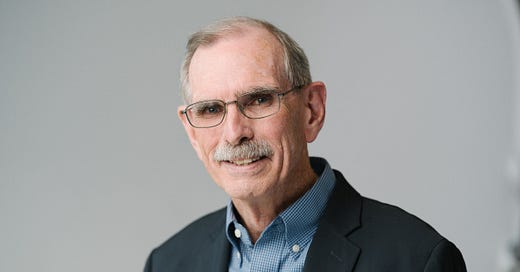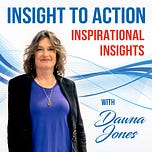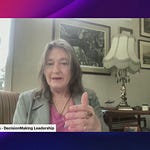Returning guest and author
shares insights that began in his first year of college with a professor who dropped his students into an experience. The lessons learned informed Rod’s executive style and what Rod calls synergistic power.The world we live in is moving beyond traditional ways of running organizations. Historically hierarchy is used to structure authority and in business has become synonymous with command and control. This doesn’t work for talented smart people who are not cogs in a wheel. Understanding personal relationship with power vs force, is central to what happens next.
Has business forgotten it can evolve?
I went to ChatGPT to get a summary of the episode: Here’s a short version of what came back.
· Understanding the distinction between "power over" and "power with": Learn how these two forms of power impact societal structures, organizational management, and personal relationships.
· Leveraging collective intelligence: Discover how engaging in "power with" rather than "power over" can amplify the collective intelligence of groups, leading to more innovative and effective outcomes.
· The importance of autonomy and order: Gain insights into how a management model focused on autonomy within a structured environment can lead to lower turnover rates and higher job satisfaction among employees.
· The evolution of Google: the journey of Google from leveraging collective intelligence to its current challenges, highlighting the importance of maintaining a "power with" philosophy.
· The implications of digital feudalism: Understand the concept of digital feudalism, where users contribute value without compensation, and envision the potential for new models that reward user participation.
· The future of artificial intelligence
· The decline of hierarchical management structures: Learn about the challenges facing traditional top-down management models in adapting to rapid changes and the rise of network structures as a more adaptable and innovative approach.
· The necessity for companies to evolve: Discover through real-world examples like Netflix and Blockbuster, the critical need for organizations to evolve their business models to survive and thrive in a rapidly changing market.
· Self-awareness and leadership in changing times: Reflect on the importance of self-awareness and the ability to adapt one's leadership style in response to shifting power dynamics and the evolving landscape of business and society.
It will take a shift from authoritative management to engaging in the collective for organizations to see more clearly and evolve versus retreat as companies appear to be doing in 2024.
Tensions exist. The tension between autonomy and order finds a middle ground where order is achieved through structures and services that support cooperation, coordination, and collaboration. The skill to move through polarities and tensions is a prerequisite to personal mastery and collective action.
Accompanying the transition from power over to ‘power with’ is a fresh set of leadership skills that start at the personal level. This shift is observable in parenting styles. When I grew up, parents were the boss and while we were free-range kids gone from dawn to dusk, compliance was expected - to a point. The parent was the highest authority. Today it is more of a cooperative approach that can support self-esteem and confidence through acceptance.
What will tomorrow bring? How can we use the tension between force vs freedom for healthier workplaces where freedom replaces force?
There is a set of inner skills and awareness that can systematically chart a course guided by fundamental principles. Understanding and being aware of the difference between force and autonomy is one. A second would be finding security within rather than hoping to control the outer world. Gaining control of yourself is the first step.
My experience living as a nomad brought this lesson home because fear can either stop you in your tracks or propel you to stretch. The utility of emotions is that they serve as a compass. How you feel gives clarity and feedback. Purpose (personal or organizational) points to the direction. The Whitehall studies revealed that having a strong sense of control was key to personal and organizational health. That is as true today as it was in 1991.
To move forward might mean looking back to recall what we already know but appear to have forgotten.
Emotions serve as the compass. Purpose points to the direction.
Thanks to my paying subscribers and all readers. Paying subscribers are invited to suggest podcast guests or questions you’d like to explore. Having been podcasting for 16 years now, your support makes a difference!!














Share this post